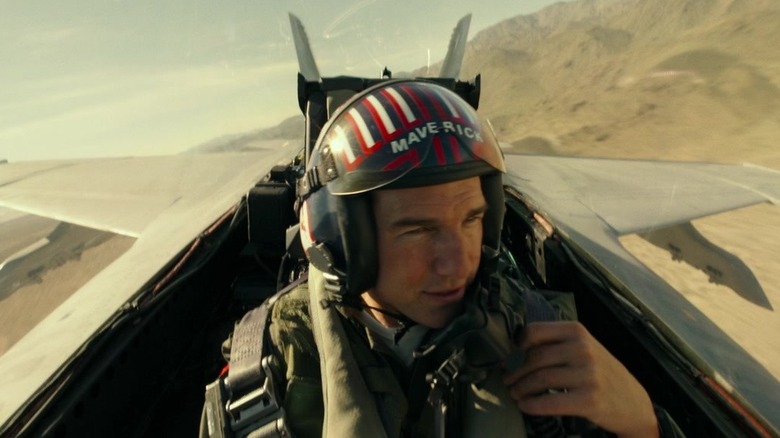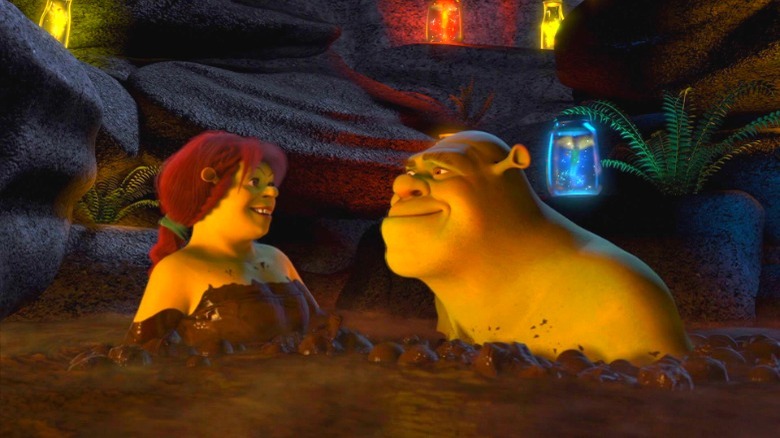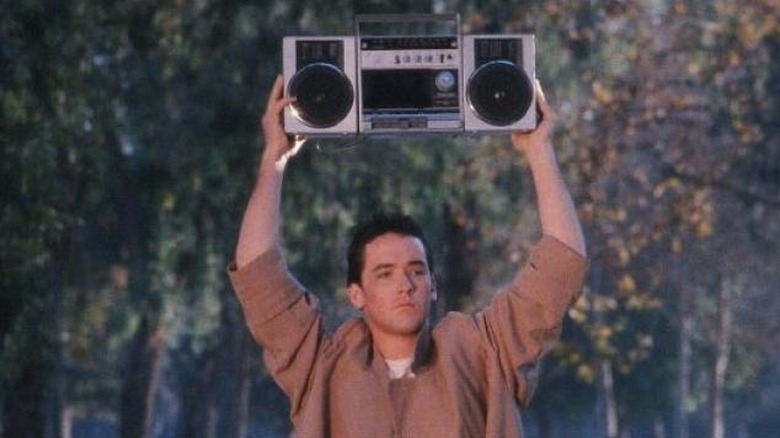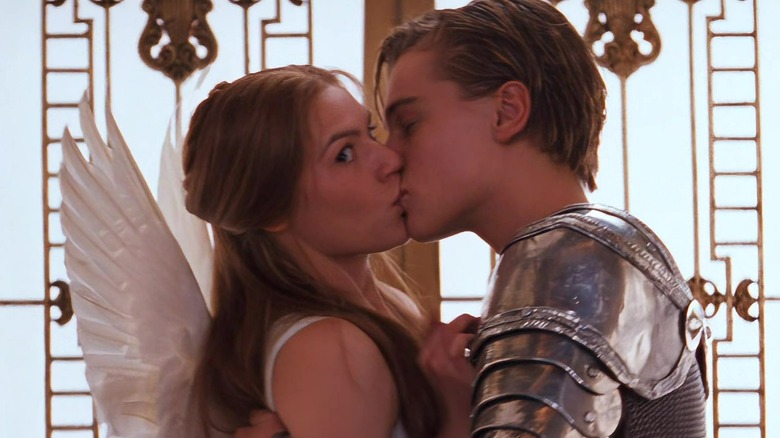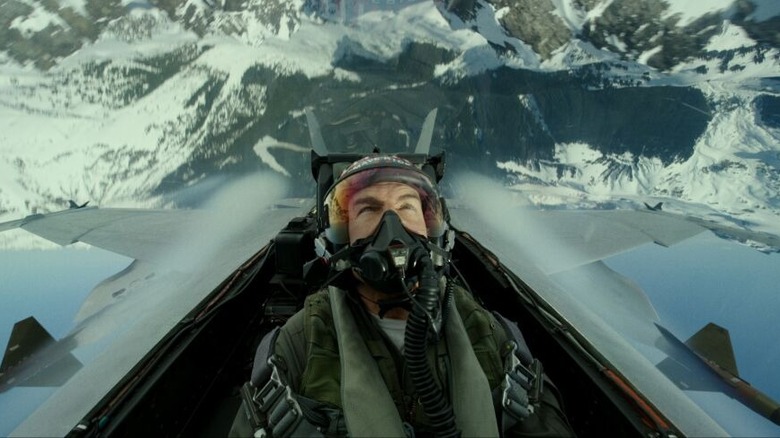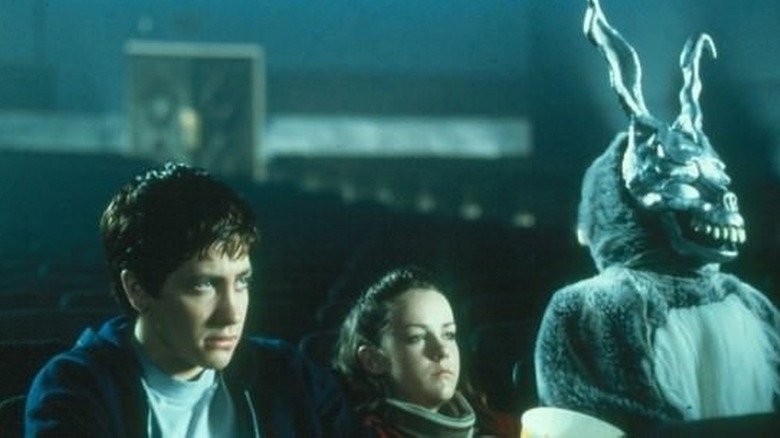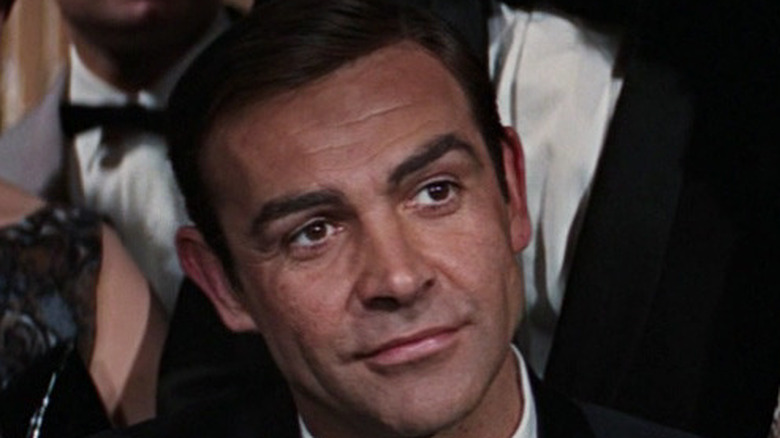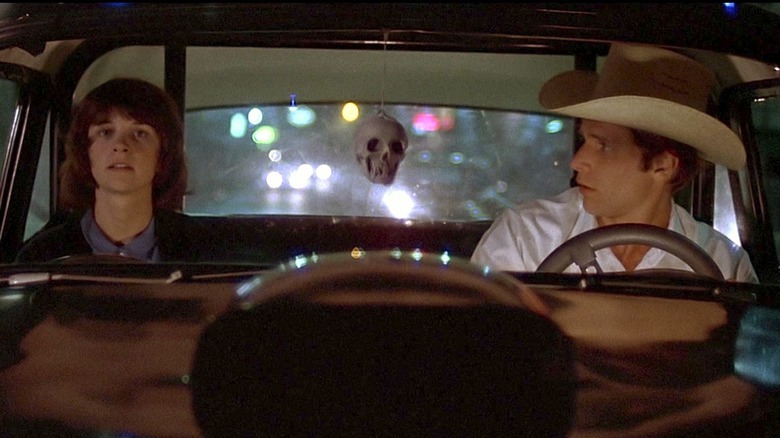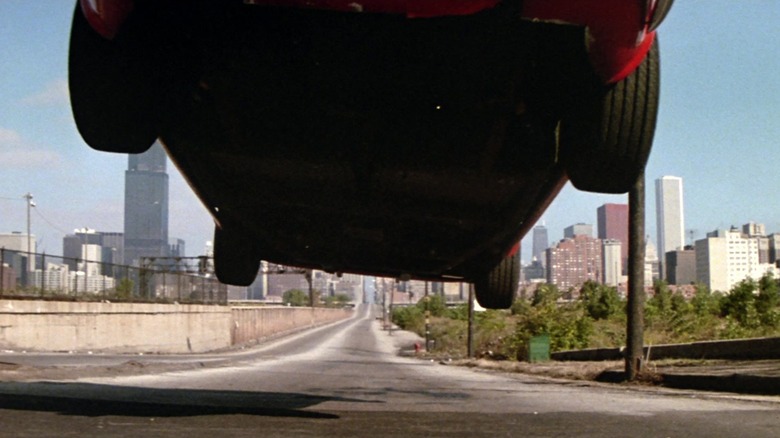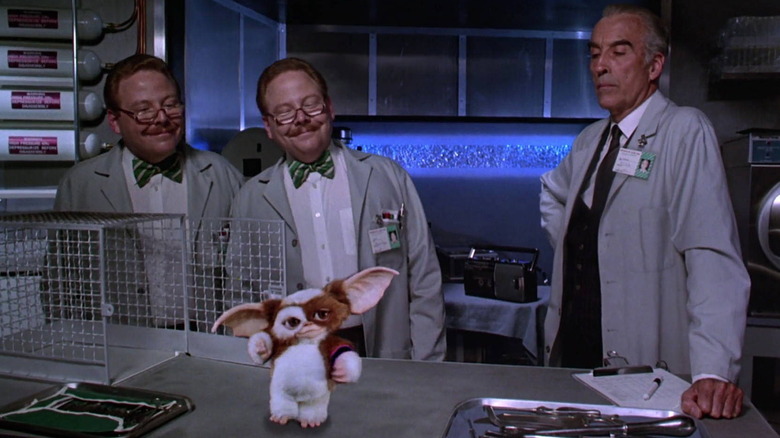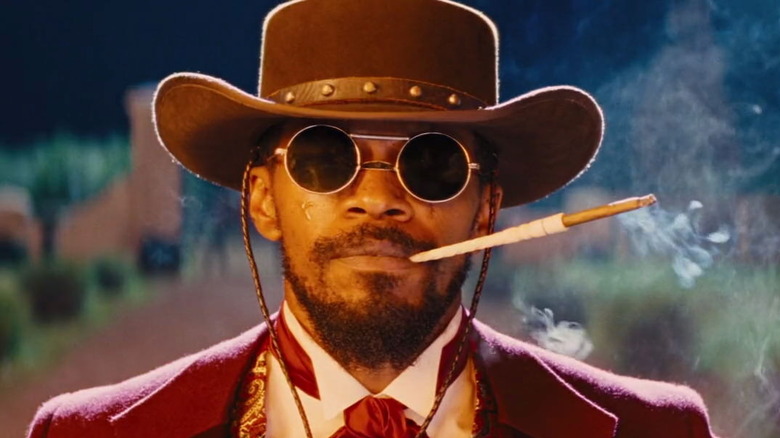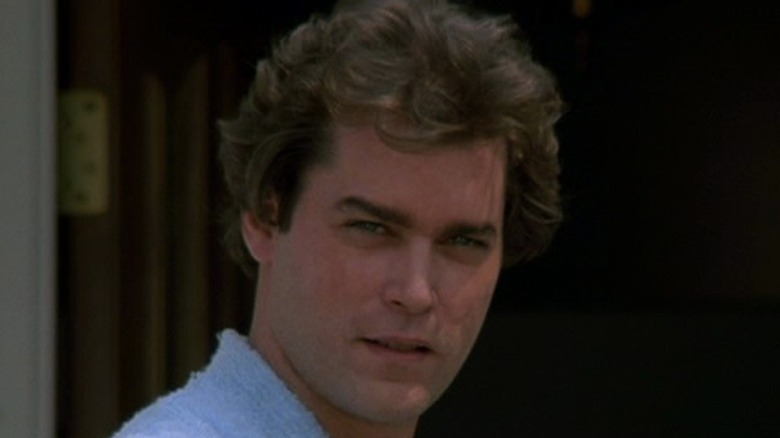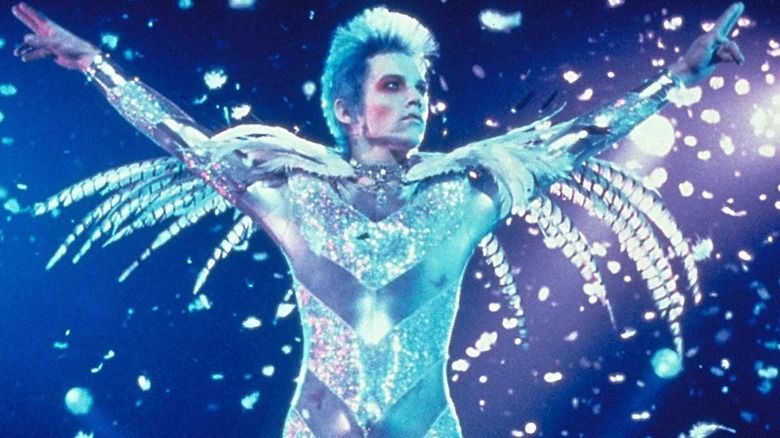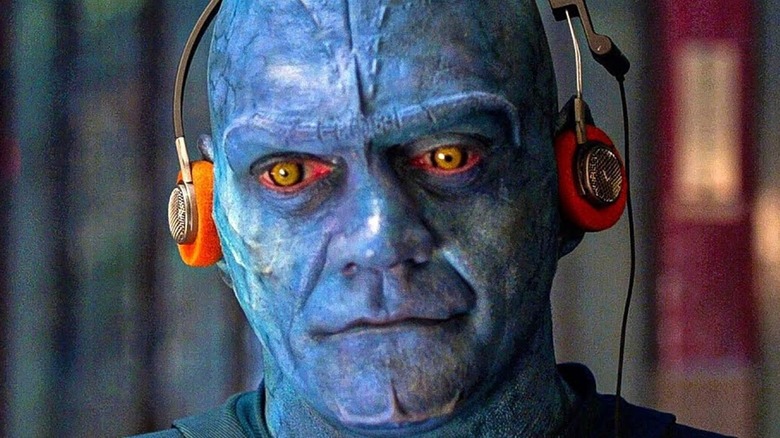13 Songs Cut From Movie Soundtracks For Unusual Reasons
There are lots of stories out there about songs that were supposedly chosen to appear in or written specifically for film soundtracks, but many of them are urban legends or improperly researched. For instance, you could be forgiven for believing Bob Dylan's "Lady Lay" was written for inclusion in 1969's "Midnight Cowboy," given how often that's reported on the internet, even though he said he penned it for Barbra Streisand.
But there are many songs that were indeed intended to be in well-known films and somehow didn't quite make it, sometimes for unusual reasons. In fact, some iconic movie moments got changed because of these musical omissions. Can you believe that anyone ever conceived anything but Peter Gabriel for the boombox serenade of "Say Anything"? Or Tom Jones belting out the title tune for "Thunderball"? Yep, that happened. Here's the story of how and why 14 such songs didn't quite make the final cut.
Bang Thwok – Shrek 2
A decade after they disbanded, the Pixies reformed to play some new concert dates. As they rehearsed, their manager informed them that DreamWorks reps wanted the newly reconstituted band to record the title song for their upcoming "Shrek 2."
Pixies vocalist-slash-bassist Kim Deal recalled the lyrics were inspired by a book she'd found on the street. It contained a paragraph-length story in a child's handwriting about "a party that took place in another universe, about people and monsters that were partying together." Of several possible approaches, hers was the more kid-friendly thing. "And then the 'Shrek 2' people gave us some money to go into a demo place to demo it. So we did," Deal said, "And they didn't take it." Ultimately, the film's opening would be accompanied by "Accidentally in Love" by Counting Crows.
But that "Bang Thwok" demo didn't end up in the trash heap. The month following the opening of "Shrek 2," the song was released as an iTunes-only single that shot to the top of the just-minted BPI U.K. Download Chart. Ironically, it would be the last song released by the Pixies' original lineup.
A Girl Like You – Say Anything
It's no coincidence that the first line of the chorus of the 1989 hit song "A Girl Like You" contains the two-word title of the 1989 film "Say Anything." Alternative rock group The Smithereens wrote the tune specifically for inclusion in the Cameron Crowe teen comedy. ”That was written for the movie 'Say Anything,'" Smithereens frontman Pat DiNizio explained in 1990, saying he based the lyrics on dialog and situations in the film. However, when the rubber met the road, the song was pulled from the film.
Drummer Dennis Diken suggested the song was dropped because a producer felt it gave away too much of the plot. Indeed, the lyrics reference that it's a time for Lloyd (John Cusack) to "be a man," as his best friend Corey advises, and that valedictorian Diane Court is planning to leave Seattle, Washington for England (lyric: "London, Washington, anywhere you are I'll run").
DiNizio had a slightly different take on why the song was cut. "At a certain point, the producer wanted me to change the lyrics and I didn't want to," and said the band decided to withdraw the song for use on their third album, titled "11." DiNizio commented that Peter Gabriel's "In Your Eyes" was used in its place, which is what ultimately played over Cusack's famous boombox serenade.
Come What May – Romeo + Juliet
2001's "Moulin Rouge!" was famous for its covers of bona fide classic tunes, and the film's only original song was "Come What May." But what you didn't know was that the song was originally written by David Baerwald for director Baz Luhrmann's prior film, 1996's "Romeo + Juliet." It didn't make the final cut of the troubled production.
As Variety noted of the Golden Globe nomination of "Come What May," "This year's surprise entry is the 'Moulin Rouge!' song, which had been ruled ineligible for the Academy Awards because it was not written specifically for the film." Indeed, the Motion Picture Academy's criteria for best original song, states that "an original song consists of words and music, both of which are original and written specifically for the motion picture." It didn't win.
That it was written for "Romeo + Juliet" is suggested by the song's title. "Come what may" is a modern idiom deriving from a later Shakespeare play, Macbeth. "Come what come may, Time and the hour runs through the roughest day."
Danger Zone re-recording – Top Gun: Maverick
The song "Danger Zone" is so welded to the original "Top Gun" that it's practically impossible to think about one without invoking the other. It'd have been an unthinkable plane crash had the song not featured in 2022's supersonic hit, "Top Gun: Maverick." But, sure enough, the film opens with the Kenny Loggins-sung original. Director Joseph Kosinski flat-out stated it was used to immediately reassure the audience that this was old-school "Top Gun" and not some modern take.
But what didn't make it to the screen was Loggins' new cover of the song recorded for the sequel. "I did re-record 'Danger Zone' to make a 5.0 version that would wrap around the audience," Loggins said, adding that Tom Cruise "wanted to conjure up the original version."
Whether Cruise or Kosinski's call, it was the right choice. Still, it would have been a blast to hear Loggins take a new shot at the material, even if just over the end credits.
West End Girls – Donnie Darko
To bring his 2001 teenage time travel saga "Donnie Darko" in on its modest $3.4 million budget, director Richard Kelly had to replace several of his intended needle drops with more cost-conscious tracks. Most notably, he wanted INXS' "Never Tear Us Apart" to play at the top of the movie, but ended up replacing the song with Echo & The Bunnymen's "The Killing Moon."
A box office bomb — the film only grossed $517,375 in its original run — its original DVD release sold well, grossing upwards of $10 million. As a result, the movie's distributor gave Kelly enough money for "Donnie Darko: The Director's Cut" for a theatrical re-release in 2004. They also gave him a music clearance budget big enough to include some of his original song choices, including "Never Tear Us Apart."
However, Kelly didn't get to restore all of his original music selections with the Director's Cut. During the Sparkle Motion dance sequence, his first choice was "West End Girls" by the Pet Shop Boys. This was replaced by "Notorious" by Duran Duran, a song that fits the scene perfectly and remained untouched in the Director's Cut.
Mr. Kiss Kiss Bang Bang – Thunderball
The original main title song for 1965's "Thunderball" was John Barry and Leslie Bricusse's "Mr. Kiss Kiss, Bang Bang," which The New York Times had reported was Bond's nickname in Italy. "There they call him 'Mister Kisskiss Bangbang.' And kisskiss bangbang is all they ask of him." Indeed, a Duccio Tessari-directed Italian spy comedy titled "Kiss Kiss ... Bang Bang" was released in 1966.
The song was recorded by "Goldfinger" singer Shirley Bassey, but at barely two-and-a-half minutes, it was too short for the film's three-minute title sequence. A longer version was subsequently recorded by Dionne Warwick. But both were abandoned in favor of having Tom Jones belt out a freshly-composed John Barry and Don Black song, "Thunderball." This directly referenced the film's title, as had been the case with the two preceding films: "From Russia With Love" and "Goldfinger."
Like a Bond Girl betrayed, Bassey sued to prevent the film's release unless her recording was used. Her initial request for a swift hearing was rejected, and the suit was probably settled or dismissed. The song vanished from the titles, but its fingerprints are present in the released picture, as the tune can be heard in the score, notably as Bond is arriving at the suitably named Kiss Kiss Club.
Some Enchanted Evening – American Graffiti
When you think of action movie stars who can belt out a tune you might go right to Hugh Jackman or Dwayne "The Rock" Johnson, but Harrison Ford?
Yet, in George Lucas' best movie — there, I said it — "American Graffiti," Ford's character, Bob Falfa, was filmed crooning the Rogers and Hammerstein classic "Some Enchanted Evening" to an unappreciative Laurie Henderson (Cindy Williams). Laurie looks like she'd rather be anywhere but riding shotgun. (Coincidentally, Williams auditioned for the role of Princess Leia in "Star Wars," and could have ended up riding shotgun to Han Solo in the Millennium Falcon's cockpit).
Ford raised hell on the set, and some of his ad-libs drove Lucas nuts. One was his tone-deaf performance of the song. It might've been perfect for his character, but apparently, it didn't please Richard Rogers — the Rogers of Rogers and Hammerstein — who refused the rights to use the music because he considered Ford's rendition an insult to his late partner, Oscar Hammerstein.
It was only after the record-breaking success of "Star Wars" that Lucasfilm was able to get the song cleared for the 1978 re-release of "American Graffiti." How? We don't know for sure, but Lucas was rolling in dough, and, hey, money talks even if Ford can't really sing.
Theme from Star Trek – Ferris Bueller's Day Off
Remember the Ferrari flight moment of "Ferris Bueller's Day Off," where a pair of very unprofessional "professional" valet parking attendants take Cameron's dad's 1961 Ferrari 250 GT California airborne? Remember the music that plays over it is the "Star Wars" theme? Well, apparently, it wasn't a sure thing. In his memoir, "A Long Time Ago in a Cutting Room Far, Far Away," Oscar-winning editor Paul Hirsch takes credit for the choice. "I had put in some temp music, as I always did, and when I showed the first cut to John [Hughes], he was enthusiastic in telling me how much he liked my choices. In the case of the Ferrari flying over camera in a spoof of the opening shot of 'Star Wars,' it seemed natural to use John Williams' theme."
However, in addition to the "Star Wars" theme, Alexander Courage's "Theme from Star Trek" was also recorded. At 30 seconds, the cue is the perfect length for the Ferrari flight. Why record both? Well, "Ferris Bueller" and "Star Trek" were both Paramount properties, so it was easier and cheaper to clear the "Star Trek" music. It seems entirely likely the "Star Trek" theme was recorded as a backup in case the studio couldn't clear the "Star Wars" music.
As it happened, the Force was strong with Ferris Bueller, and the "Theme From Star Trek" ended up in the rubbish bin.
Dancing With Myself – Gremlins 2
"E.T. with teeth," is how some described Joe Dante's horror-comedy "Gremlins." Its follow-up, "Gremlins 2: The New Batch," went less horror and more black comedy, and is one of those sequels which some think wasn't equal to its hit predecessor. Which is better is purely a matter of personal opinion.
Thirteen needle drops feature in the film's soundtrack, but one of those was a last-minute change to Gizmo's cutest moment in the picture: his dance. Dante said in 1990, "And then we couldn't get the rights to the song he was dancing to, Billy Idol's 'Dancing With Myself,' so we ended up finding this Fats Domino song ['I'm Ready'] at the last minute that happened to have exactly the same beat."
It's unknown why the song couldn't be cleared. After all, it had appeared in 1987's "Can't Buy Me Love," and two months before the "Gremlins 2" premiere, Idol's hit "Cradle of Love" featured in the soundtrack to the notorious flop, "The Adventures of Ford Fairlane." Perhaps having a song in a bomb didn't appeal to Idol, his management, or his label. Maybe that's why its use in something as unabashedly cartoonish as "Gremlins 2" was denied.
Wiseman – Django Unchained
In a puzzling flip-flop prior to the release of Quentin Tarantino's "Django Unchained," singer, songwriter, and rapper Frank Ocean told GQ Magazine that among projects in the works, one of them was a song he wrote for the eventual Oscar-winning movie. But when the soundtrack list was revealed only weeks later, Ocean's contribution was nowhere to be seen, and in the released film, nowhere to be heard.
"Frank Ocean wrote a fantastic ballad that was truly lovely and poetic in every way, there just wasn't a scene for it," Tarantino explained. "I could have thrown it in quickly just to have it, but that's not why he wrote it and not his intention. So I didn't want to cheapen his effort"
No hard feelings? Perhaps. But when he dropped the track on his Tumblr, Ocean said simply, "Django was ill without it." Mike Wolf of American Songwriter agreed, opining "It is a great example of a three-minute song saying more than a nearly three-hour movie." Ocean's orphaned "Wiseman" eventually found a cinematic home at the very end of the 2015 Jake Gyllenhaal vehicle "Southpaw."
Frank Sinatra's My Way – Goodfellas
A master class in directing is what none other than Steven Spielberg thinks of Martin Scorsese's 1990 mob classic "Goodfellas." And even after the film concludes with Ray Liotta's Henry Hill literally closing the door on us, the movie gets in one last jab: the Sid Vicious punk cover of "My Way."
It's such a stark reimagining of the song that it adds an ironic note to the closing credits the iconic Frank Sinatra version couldn't have. But, apparently, the Sinatra version is just what Scorsese originally wanted. In fact, he even wanted to make a Sinatra biopic, always opposed by the late singer and his family. "We wanted Frank Sinatra but he wouldn't let us use it, so it's Sid Vicious," frequent Scorsese collaborator and editor extraordinaire Thelma Schoonmaker told Empire Magazine. "Sinatra would never let Marty use his music [...] Why didn't he let us? Because he didn't want to be associated with the Mafia. Which, of course, he was!" Wherever the real truth lay, and no matter how he tried to distance himself from it, Sinatra's alleged association with the Mob was stuck to him like cement galoshes.
Still, in the end, Frankie could truly say of his preventing Scorsese from using his signature tune, "I did it my way!"
Various David Bowie songs – Velvet Goldmine
Actually, this is a half-dozen songs left out of one movie. Writer-director Todd Haynes' original screenplay for his glam-rock film "Velvet Goldmine" reportedly included seven Ziggy Stardust-era Bowie tunes: "All the Young Dudes," "Lady Stardust," "Lady Grinning Soul," "Let's Spend the Night Together," "Moonage Daydream," "Sweet Thing," and the B-side which provided the title, "Velvet Goldmine." But when asked for permission to use the songs, Bowie performed a "Glam Slam" and denied the request, rebuking even executive producer-slash-R.E.M. singer Michael Stipe's attempts.
This was unsurprising, given that the film's protagonist is so obviously based on Bowie, yet fictionalized enough that it might cause audiences to confuse the cinematic rocker with him. Also, Bowie had been developing his own film and stage production based on his 1972 album "The Rise and Fall of Ziggy Stardust and the Spiders from Mars." He told BBC Radio 1 in 1998, "My feeling about it was that ['Velvet Goldmine'] was based fairly substantially on Ziggy Stardust, and as I intend to do my own version of that I'd rather not work with a competitive film."
Whatever you think of the film, it probably benefited from failing to earn Bowie's blessing, as Haynes was free to make the film less a hagiography and a more biting look at glam rock, stardom, and selling out.
Russian Roulette – Guardians of the Galaxy Vol. 3
"Guardians of the Galaxy" director James Gunn has dropped songs he considered because he couldn't figure out where to use them. But there's one song he reached for that eluded his grasp: "Russian Roulette" by punk rockers Lords of the New Church, from their self-titled 1982 debut album. As Gunn revealed on Twitter: "Over 3 movies I've gotten every song I've written into a script, sometimes after much blood & toil to acquire the rights. However for the 1st time on Vol 3 we didn't get the rights to a song I wanted because it was tied up in legal battles."
What legal battles? Presumably, the song rights are disputed. In a 2021 interview, drummer Nick Turner said the band had just gotten the rights back to their first album, but that's no guarantee that other parties aren't trying to claim rights as well. And in Hollywood, unclear licensing status is a deal killer.
Had the song been cleared, it'd have been a very meta selection for "Guardians of the Galaxy Vol. 3," with lyrics that allude to the moral ambiguity of soldiers in wartime. It also references Vietnam War movies, notably — and indirectly — the infamous Russian Roulette scene in Michael Cimino's 1978 "The Deer Hunter," as well as evoking 1979's "Apocalypse Now" with its opening helicopter sounds and name-checking director Francis Ford Coppola ("Frank Coppolla" in the song). The music video cements the Vietnam connection.
